Choosing the right organic coconut oil brands is crucial. Diving into the world of natural wellness, I found myself, much like many of you, curious about organic coconut oil’s rising prominence.
Organic coconut oil is the quintessential elixir for holistic health. It’s a marvel that promises rejuvenation for your skin, hair, and inner vitality.
Are you tired of skin that feels eternally parched? Frustrated with hair that lacks shine? Or perhaps you’re on the hunt for a wholesome alternative in your culinary adventures?
I’ve walked that path, felt those same challenges, and emerged with a jar of this tropical treasure in hand. Together, let’s unravel its magic and discover the brands that truly embody its essence.
Click here to buy Organic Coconut Oil now.
What Is Organic Coconut Oil?
Organic coconut oil is derived from the meat of coconuts harvested from coconut palms cultivated without the use of synthetic fertilizers, pesticides, or genetically modified organisms. This adherence to natural farming techniques ensures that the coconut oil produced is free from harmful chemicals and retains its purest form.
The process begins with the selection of mature, high-quality organic coconuts. Once harvested, these coconuts undergo either a “dry” or “wet” method of extraction. The dry method involves drying the coconut meat, or copra, followed by pressing to extract the oil.
The wet method, on the other hand, extracts the oil directly from the raw coconut meat. Whichever method is used, the next crucial step is refining. For virgin organic coconut oil, minimal refining is done to preserve its natural nutrients.
What makes organic coconut oil particularly safe and beneficial is its extraction and processing without the use of chemicals or high temperatures. This ensures that all its natural goodness, including beneficial fatty acids and antioxidants, remains intact.
Moreover, organic certification mandates strict standards in farming and processing, ensuring consumers receive a product free from contaminants, genetically modified organisms, or artificial additives.
The result? A pure, rich, and versatile oil that stands as one of nature’s finest gifts to our health and well-being.
Related: Benefits & Uses of Coconut Oil For Hair Growth
The Differences: Virgin, Extra Virgin, Refined, Unrefined Coconut Oil
Coconut oil, with its plethora of uses and health benefits, comes in various forms, each with its distinct characteristics. Here’s a breakdown of the differences between virgin, extra virgin, refined, and unrefined coconut oil:
Virgin Coconut Oil (VCO):
Source: Extracted from the fresh meat or milk of coconuts without using excessive heat.
Process: Typically made using a cold-pressing method, ensuring minimal heat exposure. This helps retain the oil’s natural aroma, flavor, and nutrients.
Characteristics: It retains a pronounced coconut taste and scent, and is rich in antioxidants and medium-chain fatty acids.
Extra Virgin Coconut Oil:
Source & Process: There’s a common misconception propagated by marketing jargon. Unlike olive oil, which has established criteria distinguishing ‘virgin’ from ‘extra virgin’, there is no standardized difference for coconut oil. Thus, extra virgin coconut oil is often the same as virgin coconut oil.
Characteristics: Similar to VCO, it has a notable coconut flavor and smell, and preserves the oil’s natural nutritional constituents.
Refined Coconut Oil:
Source: Extracted from dried coconut meat, also known as copra.
Process: The copra undergoes bleaching (to kill contaminants, not to bleach color) and deodorizing. Some refined oils can be hydrogenated or partially hydrogenated, increasing trans fat content.
Characteristics: It has a neutral scent and flavor, making it suitable for recipes where a coconut flavor is undesired. It also has a slightly higher smoke point than VCO, making it more apt for some cooking methods.
Unrefined Coconut Oil:
Source & Process: This is essentially the same as virgin coconut oil. It’s extracted from the fresh meat or milk of coconuts without high heat or chemicals.
Characteristics: Retains a natural coconut aroma and taste and houses the maximum nutritional benefits of the oil.
Click here to buy organic coconut oil unrefined cold pressed now.
How To Choose Organic Coconut Oil
Choosing the right organic coconut oil requires an understanding of your specific needs and knowledge about the product’s features. Here’s a step-by-step guide to help you make an informed choice:
Purpose of Use:
Culinary: If you’re using it for cooking, baking, or as a food supplement, a neutral flavor might be preferable, so consider refined coconut oil. However, for dishes where a coconutty flavor enhances the dish, virgin or unrefined would be ideal.
Cosmetic: For skin and hair, virgin or unrefined coconut oil retains more beneficial properties.
Check for Certifications:
Ensure it’s genuinely “organic” by looking for credible organic certifications on the label, like USDA Organic or the equivalent in your country.
Virgin vs. Refined:
If you desire the maximum nutrients and authentic coconut flavor and aroma, go for virgin or unrefined coconut oil.
If you prefer a neutral taste and smell, opt for refined coconut oil.
Packaging:
Glass jars are preferable as they don’t leach any chemicals into the oil, unlike some plastic containers.
Dark containers are a bonus as they protect the oil from light, which can degrade its quality over time.
Read the Ingredients:
True organic coconut oil should have only one ingredient: coconut oil. Avoid oils with additives, chemicals, or any unfamiliar terms.
Extraction Method:
Look for “cold-pressed” on the label. This means the oil was extracted without high heat, preserving its beneficial properties.
Check the Appearance:
Quality virgin coconut oil should be clear when liquid and uniformly white when solid. Any discoloration could indicate impurities or poor processing.
Scent and Taste:
Virgin coconut oil should have a mild coconut scent and flavor. A strong aroma could mean it’s rancid or poorly processed. Refined coconut oil should be neutral in both.
Avoid Hydrogenated Varieties:
Hydrogenated or partially hydrogenated coconut oils contain unhealthy trans fats. Always ensure the oil you choose is non-hydrogenated.
Price and Brand Reputation:
You often get what you pay for. Extremely cheap oils may compromise on quality. Research brands read reviews, and perhaps even reach out to brands to inquire about their production methods if you’re uncertain.
Click here to buy organic coconut oil for your baby now.
Our Top Picks of Organic Coconut Oil Brands
1) Dr. Bronner’s – Organic Virgin Coconut Oil
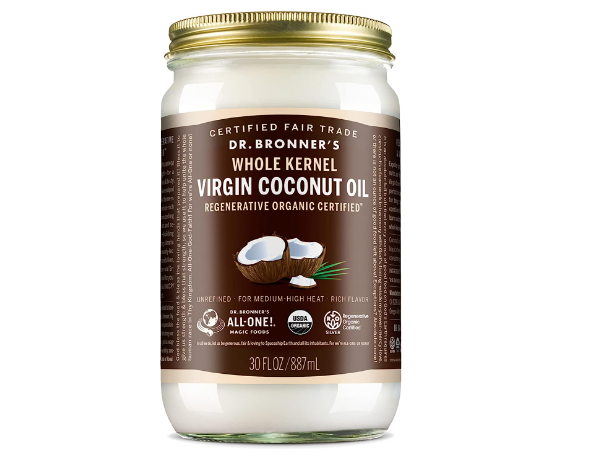
Dr. Bronner’s is a brand I’ve always held in high regard due to its commitment to organic, sustainable, and ethical practices. Their Organic Virgin Coconut Oil mirrors this ethos, being sourced from fair trade and regenerative organic farming practices. As I delved into various organic coconut oil brands, my choice gravitated towards Dr. Bronner’s for its uncompromising values and the consistent quality it brings to the table.
I chose Dr. Bronner’s because it not only speaks of quality but also advocates for ethical consumerism. After comparing numerous brands, it was evident that Dr. Bronner’s commitment to sustainability and ethical sourcing made it distinct. I believe this brand is best for those who are environmentally conscious and want a product that aligns with their values.
Pros:
- Ethically sourced, emphasizing fair trade practices
- Pure and organic, ensuring no chemical additives or contaminants
- Versatile in its uses, suitable for both culinary and cosmetic applications
Cons:
- Priced higher than some other brands on the market
- Distinct coconut flavor might not be suitable for all culinary dishes
- Packaging might be considered bulky for limited storage spaces
2) Nutiva Organic Virgin Coconut Oil
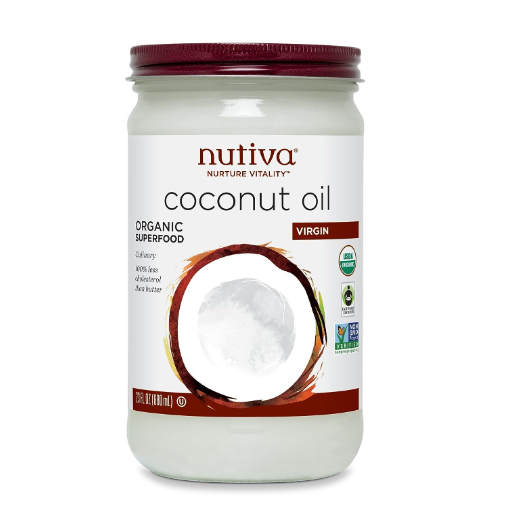
Nutiva stands as a pillar in the realm of organic products, consistently delivering high-quality offerings to consumers. Their Organic Virgin Coconut Oil exemplifies this commitment, produced with a dedication to purity and ethical sourcing. A leading choice for many, this coconut oil is an embodiment of the brand’s passion for natural, unrefined products that benefit both the body and the environment.
When selecting products for my list, Nutiva’s brand quickly rose to the top, not just for its reputation but also for the evident care it put into its products. In judging and comparing various organic coconut oil brands, Nutiva’s consistent focus on sustainability and organic farming practices marked it as different. I determined that this brand is best for those prioritizing high-quality, pure products that have a minimal environmental footprint.
Pros:
- Commitment to organic and non-GMO practices ensures product purity
- Sustainability is at the forefront with a focus on reducing the carbon footprint
- Multipurpose use, apt for both dietary and external applications
Cons:
- Can be more expensive than non-organic alternatives
- The aroma and taste, though natural, might be strong for some users
- Solidifies at lower temperatures, which may require heating for certain applications
3) 365 Organic Unrefined Coconut Oil
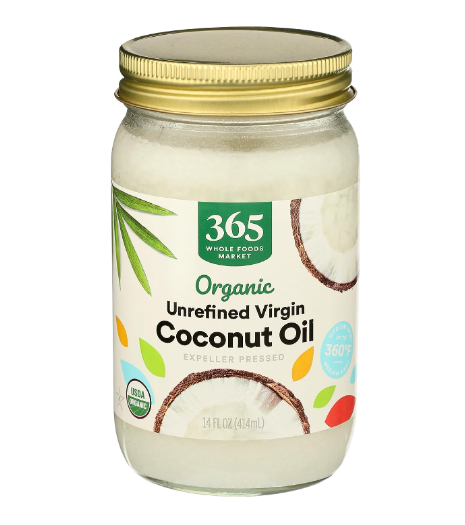
365 Organic has etched its mark in the organic community, primarily due to its straightforward approach to offering wholesome, clean products. Their Unrefined Coconut Oil reflects this ethos, promising an untampered product, derived without unnecessary refinements or additives. It serves as a testament to the brand’s consistent drive towards maintaining nature’s integrity.
In the process of selecting standout brands for my list, 365 Organic consistently echoed the principles I value in quality and authenticity. When comparing and judging the plethora of options available, 365 Organic’s straightforward, no-nonsense approach to its products distinctly stood out. I believe this organic coconut oil brand is best for those who want a straightforward, unaltered product that stays true to nature’s design.
Pros:
- Unrefined nature ensures the retention of natural nutrients
- Backed by a reputable brand known for quality organic products
- Versatile, making it suitable for a myriad of applications from cooking to skincare
Cons:
- The robust coconut flavor might not be everyone’s preference
- Might be a bit pricier than refined alternatives
- Requires storage in cooler environments to maintain consistency
4) La Tourangelle, Organic Virgin Unrefined Coconut Oil
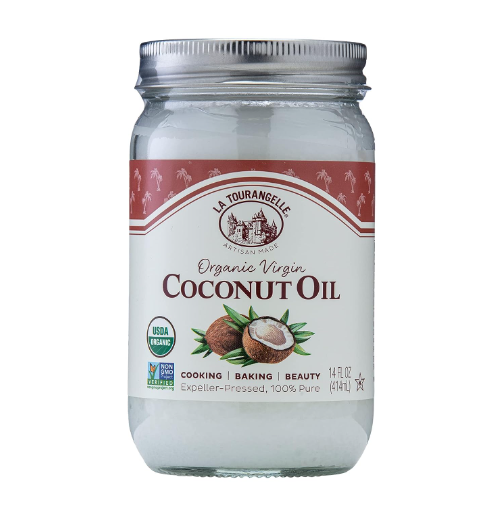
La Tourangelle stands as a beacon of artisanal craftsmanship in the world of oils. With deep-rooted traditions stemming from the Loire Valley of France, the brand carries forward its legacy of producing fine oils. Their Organic Virgin Unrefined Coconut Oil is a manifestation of this heritage, crafted with care and unyielding standards of quality.
While curating a list of top-tier brands, La Tourangelle emerged as a frontrunner due to its rich history and dedication to artisanship. Through comparison and judgment of several contenders, La Tourangelle’s emphasis on traditional production techniques made it uniquely prominent. I am of the opinion that this brand is best for those who appreciate a blend of tradition and quality in their culinary choices.
Pros:
- Produced with traditional methods, ensuring purity and quality
- Imparts a mild and pleasant coconut flavor, suitable for varied recipes
- Organic and unrefined, retaining the natural benefits of the coconut
Cons:
- Might come at a premium price given its artisanal nature
- The glass packaging, while eco-friendly, can be fragile
- The texture might vary slightly due to its natural processing method
5) NOW Organic Virgin Coconut Cooking Oil
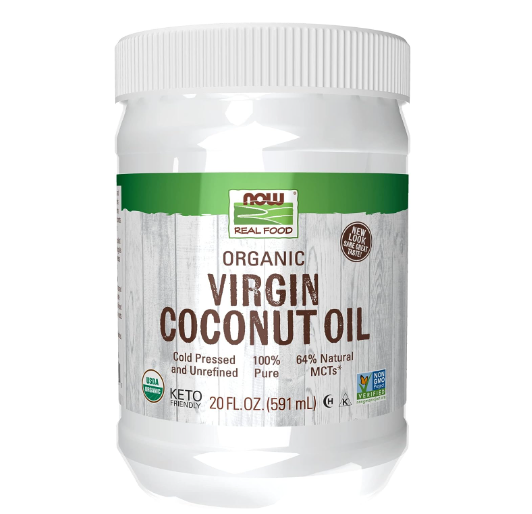
NOW is a name synonymous with natural wellness, with a longstanding commitment to offering health-centric products. Their Organic Virgin Coconut Cooking Oil underscores this dedication, formulated specifically for the discerning chef who values both health and flavor. By merging the goodness of virgin coconut oil with cooking requirements, NOW offers an oil that does justice to both nutrition and culinary excellence.
Navigating the maze of organic coconut oil brands, NOW presented itself as a reliable choice. When I compared and judged based on several criteria, NOW’s evident emphasis on health and culinary performance made it distinctive. From my perspective, this brand stands out as best for health-conscious cooks who refuse to compromise on taste.
Pros:
- Tailored for cooking, ensuring heat stability and consistent performance
- Retains the natural nutrients typically found in virgin coconut oil
- Backed by a trusted brand with a strong emphasis on natural wellness
Cons:
- Might be slightly more expensive than conventional cooking oils
- The container design might not be user-friendly for all
- As with many natural products, it may solidify at cooler temperatures
6) Nutiva Organic Steam-Refined Coconut Oil
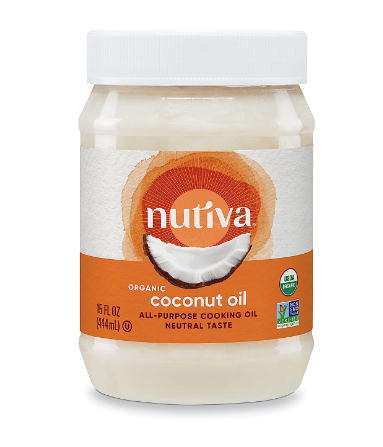
Nutiva, a reputed name in the organic space, has consistently championed purity and sustainability. Their Organic Steam-Refined Coconut Oil is a testament to this dedication, offering a product refined without the use of harsh chemicals. By leveraging steam refinement, Nutiva ensures a neutral flavor while preserving the inherent goodness of the coconut.
In my quest to list noteworthy organic coconut oil brands, Nutiva’s approach to refinement caught my attention. Through judging and evaluating numerous options, the brand’s unique steam-refined method and its commitment to organic integrity differentiated it from others. I believe this brand is best for those seeking a milder taste without forsaking the organic essence.
Pros:
- Steam refinement ensures the absence of chemical residues
- The neutral flavor makes it versatile for varied cooking needs
- Upholds organic standards, ensuring a clean product
Cons:
- Lacks the pronounced coconut aroma some users might prefer
- Might be pricier than non-steam refined options
- Packaging might not cater to all user preferences
Related: Coconut Oil for Face: A Natural Solution for Radiant Skin
Summary
Selecting organic coconut oil brands is a choice rooted in health, environmental consciousness, and a commitment to ethical farming practices. When you opt for organic, you’re choosing an oil extracted from coconuts grown without synthetic chemicals, pesticides, or fertilizers. This not only ensures a purer, chemical-free product but also promotes sustainable farming methods that are gentler on the environment.
Moreover, organic coconut oil often retains more of its natural nutrients, providing a rich source of medium-chain fatty acids and offering potential health benefits such as improved metabolism, anti-inflammatory properties, and antimicrobial effects. When making the switch to organic, one also supports farming communities that prioritize the health of both the land and the consumer.



Comments are closed.